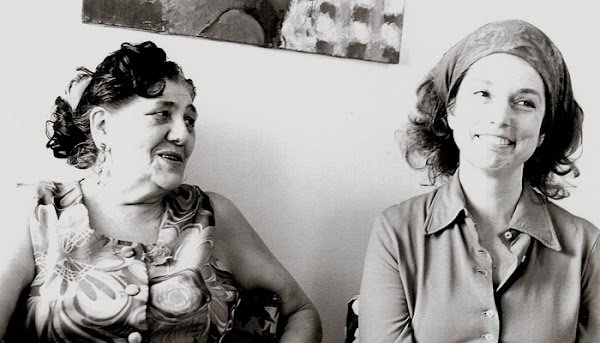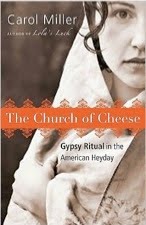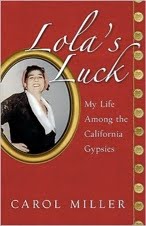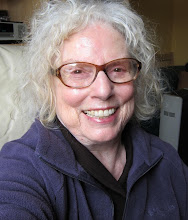Mornings, waking up, the dreams of the night usually burst like fugitive and fragile soap bubbles. But not always.
I am at a gathering and dear Katy sits beside me. As we have done so many times before, we make plans for the clothes we might wear to the next Machvaia party. But dream transitions are fluid and, look, Gypsies are arriving! We are already at a Machvaia party!
The people are ready: they bring their best party look, their good will, good thoughts, and the intent for celebration. Frissons of excitement as I realize they are asking who I am. More frissons as I am reminded that I am an Outsider and, by Machvaia law, am not supposed to be here.
But the nearness of Katy reassures me. Katy is my benefactor, protector, friend through many years of parties. In my dream I can't really see her clearly. But I can feel her warmth, the comfort of sharing; we are joined in the joy of innumerable experiences like these. Now dead a decade, she is, to me, more compellingly alive than ever. So alive that Katyness greets me on awakening. Katyness follows me through the day and into the week, making me invincible.
Thursday, September 16, 2010
Thursday, September 2, 2010
The New Yorker
Hit start, email, and I am off, fitting puzzle piece to puzzle piece and feeling rather skillful while playing The New Yorker put-the-cover-together game. I do the puzzles often -- there are thousands. That's how I discovered the magazine was born in 1925, only two years before I was, and that we are buddies on the seas of time.
As I complete a cover, I try to remember what was happening in the world and in my life that week, and match it, as best I can, with whatever the artist has depicted. (Bemelmans, Thurber, Steinberg, Sempe' are favorites.) I don't always manage, but I do approve the political bent of recent decades, particularly the pyramid of black sea birds in silhouette after the BP oil disaster. Too much talk about money and too little about the loss of sea life was my opinion of the spill and The New Yorker echoed my take with a cover.
As young woman I remember an older woman in "The Talk of the Town" section who wrote very simply about the mundane events of her life and made me long to be there, in New York, and to write, like she did, about the beauty to be found in ordinary moments, about small details given a fond and careful attention. Who was she? A mentor never thanked and large forgotten until brought to memory during a puzzle game.
Although not a physical anthropologist, I was teaching Human Evolution at several local community colleges during the early seventies and often found what I needed for class in The New Yorker. One time I copied pages of Rachel Carson's The Silent Spring as handouts for my students. Since then, everything I taught seems dated except for my thesis, man shaped by, and shaping, the environment, and the incomparable The Silent Spring.
The New Yorker has followed me everywhere. The years -- decades really -- I was studying and living with the Machvaia Roma Gypsies, I would play hooky on occasion, rent a room at Motel 6, and spend a vacation day or two in America, which what Machvaia call the Outsider's world, collating my fieldnotes and enjoying the latest issue of The New Yorker.
The New Yorker has proved useful in ways that could never have been anticipated. I was only 26 and the mother of two small children when my husband was considered for a transfer from Seattle to New York. No need to describe my excitement when his potential boss, Harry Disston, asked us to dinner. Of course I knew all about the current Broadway shows and recently opened restaurants, and of course my husband Roger got the job. This gave us three and a half marvelous years on the east coast the happiest years of our marriage. At dinner, Harry seemed confused when I assured him I had never actually been to New York.
In the eighties, my fifteen-year-old granddaughter won a scholarship to the School of American Ballet and I chaperoned her to New York. We had too little money and lived most of that difficult year in shared lodgings. My secretary salary at Harper-Row hardly covered our cheap rent and groceries. To cheer myself up, I would take the subway to The New Yorker building, ride up and down on each of the many elevators, pretend I worked there, and enjoy the civil ambiance.
The New Yorker has been like my big brother, the one who went to school at Princeton or Yale. It has introduced me to a world of literate, elegant writing and clear thinking, but mostly to a value system that suits me and that I have incorporated during my years of reading The New Yorker.
As I complete a cover, I try to remember what was happening in the world and in my life that week, and match it, as best I can, with whatever the artist has depicted. (Bemelmans, Thurber, Steinberg, Sempe' are favorites.) I don't always manage, but I do approve the political bent of recent decades, particularly the pyramid of black sea birds in silhouette after the BP oil disaster. Too much talk about money and too little about the loss of sea life was my opinion of the spill and The New Yorker echoed my take with a cover.
As young woman I remember an older woman in "The Talk of the Town" section who wrote very simply about the mundane events of her life and made me long to be there, in New York, and to write, like she did, about the beauty to be found in ordinary moments, about small details given a fond and careful attention. Who was she? A mentor never thanked and large forgotten until brought to memory during a puzzle game.
Although not a physical anthropologist, I was teaching Human Evolution at several local community colleges during the early seventies and often found what I needed for class in The New Yorker. One time I copied pages of Rachel Carson's The Silent Spring as handouts for my students. Since then, everything I taught seems dated except for my thesis, man shaped by, and shaping, the environment, and the incomparable The Silent Spring.
The New Yorker has followed me everywhere. The years -- decades really -- I was studying and living with the Machvaia Roma Gypsies, I would play hooky on occasion, rent a room at Motel 6, and spend a vacation day or two in America, which what Machvaia call the Outsider's world, collating my fieldnotes and enjoying the latest issue of The New Yorker.
The New Yorker has proved useful in ways that could never have been anticipated. I was only 26 and the mother of two small children when my husband was considered for a transfer from Seattle to New York. No need to describe my excitement when his potential boss, Harry Disston, asked us to dinner. Of course I knew all about the current Broadway shows and recently opened restaurants, and of course my husband Roger got the job. This gave us three and a half marvelous years on the east coast the happiest years of our marriage. At dinner, Harry seemed confused when I assured him I had never actually been to New York.
In the eighties, my fifteen-year-old granddaughter won a scholarship to the School of American Ballet and I chaperoned her to New York. We had too little money and lived most of that difficult year in shared lodgings. My secretary salary at Harper-Row hardly covered our cheap rent and groceries. To cheer myself up, I would take the subway to The New Yorker building, ride up and down on each of the many elevators, pretend I worked there, and enjoy the civil ambiance.
The New Yorker has been like my big brother, the one who went to school at Princeton or Yale. It has introduced me to a world of literate, elegant writing and clear thinking, but mostly to a value system that suits me and that I have incorporated during my years of reading The New Yorker.
Subscribe to:
Posts (Atom)



